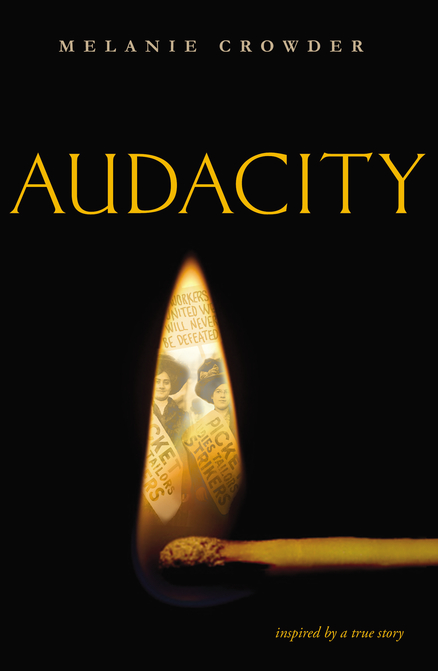Guest Post: Author Melanie Crowder on Writing History in Verse
You know we love verse novels here at Clear Eyes, Full Shelves, so it's no wonder that Melanie Crowder's historical novel in verse is one we're all looking forward to.
Here's the summary:
The inspiring story of Clara Lemlich, whose fight for equal rights led to the largest strike by women in American history.
A gorgeously told novel in verse written with intimacy and power, Audacity is inspired by the real-life story of Clara Lemlich, a spirited young woman who emigrated from Russia to New York at the turn of the twentieth century and fought tenaciously for equal rights. Bucking the norms of both her traditional Jewish family and societal conventions, Clara refuses to accept substandard working conditions in the factories on Manhattan's Lower East Side. For years, Clara devotes herself to the labor fight, speaking up for those who suffer in silence. In time, Clara convinces the women in the factories to strike, organize, and unionize, culminating in the famous Uprising of the 20,000.
Powerful, breathtaking, and inspiring, Audacity is the story of a remarkable young woman, whose passion and selfless devotion to her cause changed the world.
I'm happy to welcome Melanie to the blog--she's going to share a bit about the unique opportunity to translate history through verse novels.
As a reader, I love verse novels. They have this unique ability to sweep me up and carry me in a single, breathless surge from the first page to the last. As a writer, I appreciate verse for different reasons.
For Audacity, the elevated language and image-rich lines of free verse was the perfect fit. It allowed me to capture Clara’s passions and aspirations, her triumphs and crushing defeats on the page. But there is another reason it worked so well.
When I sit down to write a new story, I like to take some time to identify why I’m so drawn to those particular characters, or that series of events. I try to pinpoint what I hope readers will take away, what tone I will strike, and how the arc of the story will curve to its inevitable end.
I decided early on that Audacity’s arc needed to begin with Clara’s early years. In order for her bravery to mean something, in order for her selflessness to resonate, readers had to understand all that she came from, all that had shaped her into such an extraordinary individual.
I could have shown this in flashback. But I wanted readers to live through the violent anti-Semitism Clara’s community faced, to feel the way she craved and was denied an education, to know why she set herself apart from those around her. Doing that meant I needed to back up, to start at the beginning.
Opening this story in the Russian Empire during Clara’s teen years, however, meant I would have six years to cover in the novel. Some books take place on a single day, or within the span of a week. Six years is a lot. But each one of those years held some part of the whole that I couldn’t leave out. Clara’s determination is something she grew into, something that solidified inside her until there was no other way forward. I couldn’t leave all that becoming out of her story.
Writing in verse gave me the freedom to speed up and slow down the timeline as the story demanded. I treated each poem like a snapshot of a scene, staged with historical minutia, shaded in sensory detail, and tinted by the workings of Clara’s mind and heart. Put together, all those little snapshots create a narrative that skips and slows and skips again through time—a little like flipping through pages in a photo album. It’s an effect that wouldn’t have worked half so well in prose.
But it allowed for everything I hoped for when I first sat down to envision Audacity—intense emotion, a vivid historical setting, and free verse’s deft handling of passing time.
Melanie Crowder is a writer and educator living on the Colorado Front Range. She holds an MFA in Writing from Vermont College of Fine Arts. This is her second novel. Visit her website at www.melaniecrowder.net.

Stream It Saturday: Manhattan (TV)








